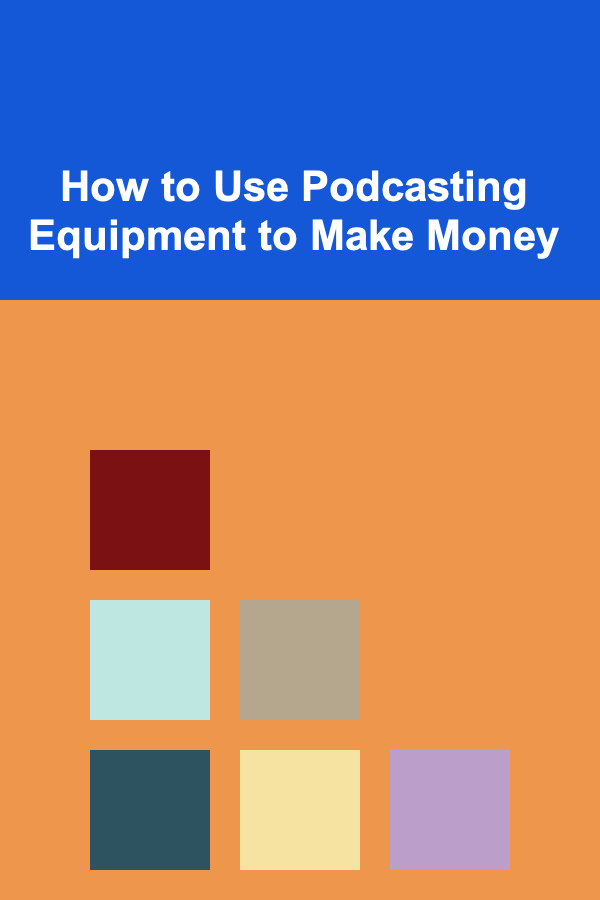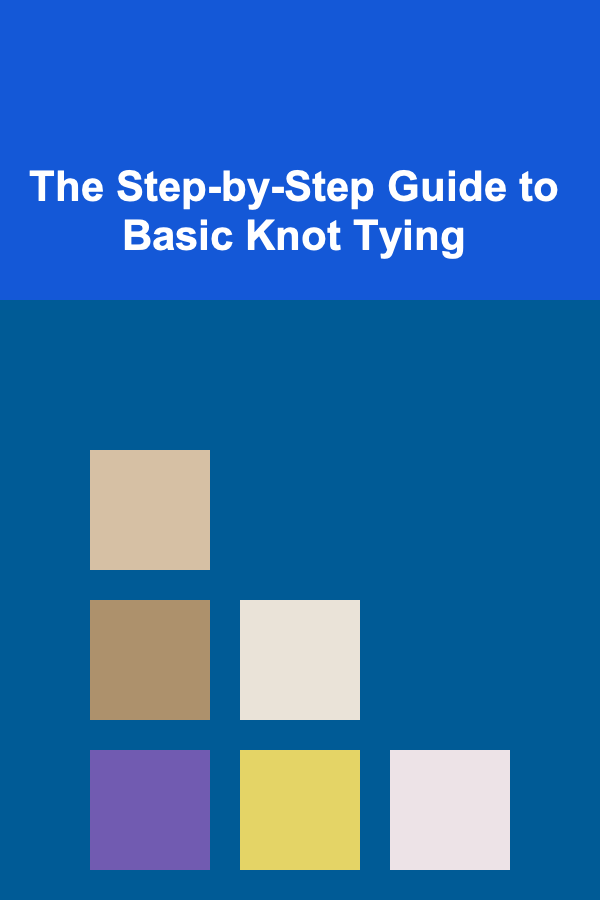
How to Use Podcasting Equipment to Make Money
ebook include PDF & Audio bundle (Micro Guide)
$12.99$5.99
Limited Time Offer! Order within the next:

Podcasting has evolved into a powerful platform for content creators, businesses, and influencers to reach audiences worldwide. With millions of active podcasts and listeners growing every year, the opportunity to monetize a podcast has never been more accessible. However, creating a successful podcast requires more than just a microphone and a recording device. The right podcasting equipment, coupled with a solid strategy, can significantly enhance the quality of your content and increase your chances of generating revenue.
This article explores how to use podcasting equipment strategically to make money. We will discuss the different types of equipment you need to start a podcast, the key elements of a monetization strategy, and practical tips for leveraging podcasting equipment to maximize earnings.
The Importance of Quality Podcasting Equipment
Podcasting is a medium based on audio content. Unlike YouTube or blogging, the main focus is on sound, and this means that the quality of your audio is paramount. High-quality equipment is not just about better sound quality; it also plays a role in how professional your podcast sounds and how much your audience trusts you.
Key Podcasting Equipment
-
Microphone
The most essential piece of podcasting equipment is the microphone. The quality of your microphone directly affects the audio quality of your podcast. There are two main types of microphones commonly used in podcasting:
- Dynamic Microphones: These microphones are great for podcasting because they focus on sound directly in front of them and reduce background noise. They are more durable and often cheaper than condenser microphones.
- Condenser Microphones: These are more sensitive and capture a wider range of sounds, making them ideal for studio-like environments. However, they tend to pick up more background noise, which requires additional soundproofing.
-
Audio Interface
An audio interface converts analog signals from the microphone into digital signals that your computer can process. For a high-quality recording experience, it is important to invest in a good audio interface to ensure clear, distortion-free sound.
-
Headphones
While it may seem like a secondary piece of equipment, high-quality headphones are essential for monitoring your audio in real-time. When recording a podcast, you need to be able to hear everything clearly---any buzzing, hums, or inconsistencies will be easy to detect with the right headphones.
-
Pop Filter and Shock Mount
A pop filter helps reduce harsh popping sounds that occur when certain words (like "p" and "b") are pronounced. A shock mount holds your microphone in place while reducing vibrations from any external movement. Both of these tools can significantly improve your audio quality, making your podcast more professional and listenable.
-
Recording Software
The software you use to record and edit your podcast will play a big role in how your podcast sounds. Programs like Audacity, Adobe Audition, and GarageBand allow for precise editing, noise reduction, and multi-track recording.
-
Mixer
If you plan to have multiple hosts or guests on your podcast, a mixer can help manage the audio levels for each person. This equipment allows you to adjust the volume, pitch, and effects in real-time, ensuring that each participant's voice is balanced.
-
Soundproofing Equipment
The room in which you record matters. Ideally, your recording environment should be quiet with minimal echo. You can use soundproofing materials like foam panels, carpets, and curtains to reduce outside noise and improve your audio.
Building a Monetization Strategy for Your Podcast
Investing in podcasting equipment is just the first step. To turn your podcast into a source of income, you need to have a well-thought-out monetization strategy. Here are several ways you can make money from podcasting:
1. Sponsorships and Advertisements
One of the most common ways to monetize a podcast is through sponsorships and advertisements. Businesses are eager to promote their products or services to targeted audiences, and if your podcast has a loyal following, you can secure sponsorship deals.
- Pre-roll and Post-roll Ads: These are advertisements placed at the beginning (pre-roll) or end (post-roll) of an episode. You can negotiate with sponsors for a flat rate or a per-episode fee.
- Mid-roll Ads: These are ads placed in the middle of the podcast. They generally command a higher price because listeners are more likely to engage with them when they are already invested in the content.
To secure sponsorship deals, you need to build a steady and engaged listener base. The more niche your audience, the more valuable you are to potential sponsors. Having professional-quality audio ensures that advertisers see you as a serious podcaster and makes them more likely to invest in your podcast.
2. Affiliate Marketing
Affiliate marketing is another way to generate revenue from your podcast. This involves promoting a product or service and earning a commission for every sale made through your unique affiliate link.
To succeed with affiliate marketing in podcasting, choose products that align with the interests of your audience. For example, if your podcast focuses on technology, you could promote tech gadgets or software. Make sure to provide honest and authentic reviews of the products you promote to maintain trust with your listeners.
3. Paid Subscriptions and Premium Content
Some podcasters opt to offer premium content or paid subscriptions. This could involve offering bonus episodes, early access to content, or ad-free episodes in exchange for a monthly subscription fee.
Platforms like Patreon allow creators to set up a subscription model and offer exclusive content to paying listeners. This is a great way to generate consistent income, especially if you have a dedicated fanbase willing to support your work.
4. Merchandise Sales
Selling podcast merchandise is a great way to engage your audience and generate additional income. Whether it's branded T-shirts, mugs, or hats, merchandise provides fans with a way to show their support for your podcast while giving you a new revenue stream.
For example, if your podcast is about pop culture or sports, you can sell themed items that resonate with your audience. The key here is to design high-quality, attractive products that your listeners would be proud to wear or use.
5. Crowdfunding and Donations
Crowdfunding platforms such as Kickstarter or GoFundMe can be a good way to fund a podcast, particularly when you are just starting. You can ask your listeners to donate towards the production of your show, offering incentives like shout-outs or exclusive content in return.
Similarly, platforms like Patreon can enable you to build a long-term relationship with your audience by offering them an easy way to support your work financially.
6. Offering Consulting or Services
If you have expertise in a particular field, you can use your podcast as a platform to promote your consulting or freelance services. For instance, if you host a podcast about digital marketing, you could offer marketing consultations to businesses or individuals in need of advice.
Your podcast acts as a portfolio, demonstrating your knowledge and expertise to potential clients. By using your podcast to share valuable insights, you establish yourself as an authority in your niche, increasing the likelihood that listeners will want to hire you for your services.
How Podcasting Equipment Enhances Your Monetization Strategy
While monetizing a podcast requires strategy and planning, your podcasting equipment plays a crucial role in making that strategy work. Here's how investing in quality equipment can help you monetize your podcast effectively:
1. Professional Sound Quality Builds Credibility
When listeners hear a well-produced podcast, they are more likely to trust you and your content. Clean, clear audio conveys professionalism, making your podcast appear more polished and credible. Sponsors and advertisers are more likely to invest in podcasts that sound high-quality, as they want to ensure their message is delivered clearly to the audience.
2. Better Audio Quality Equals Better Engagement
When your listeners can easily hear and engage with your content, they are more likely to continue listening to your episodes, share them with friends, and become loyal followers. Higher engagement increases your chances of monetization, as advertisers and sponsors prioritize podcasts with high levels of listener interaction.
3. Reducing Technical Issues Increases Consistency
Using the right equipment helps reduce the number of technical issues during recording, editing, and broadcasting. By ensuring a smooth recording process, you will be able to maintain a consistent release schedule, which is vital for building and retaining an audience.
Consistency is key to growing your podcast audience, and a regular release schedule gives listeners something to look forward to. Sponsors and advertisers will also value consistency, as it provides them with reliable opportunities for ad placements.
Conclusion
Podcasting is a powerful medium for content creation, and with the right equipment and monetization strategies, you can turn your podcast into a profitable venture. High-quality equipment such as microphones, audio interfaces, and soundproofing tools are essential for creating a professional-sounding podcast that attracts listeners and advertisers. However, equipment alone won't ensure success---you also need to build a loyal audience and employ effective monetization strategies.
By leveraging your podcasting equipment to create excellent audio content, maintaining a professional image, and implementing strategies like sponsorships, affiliate marketing, and merchandise sales, you can start generating income from your podcast. As the podcasting industry continues to grow, there are countless opportunities for podcasters to turn their passion into a sustainable business.
Reading More From Our Other Websites
- [Home Renovating 101] How to Choose the Right Paint Colors for Your Home Renovation
- [Trail Running Tip 101] Stories from the Singletrack: Real‑World Experiences of Trail Runners at Every Stage
- [Home Space Saving 101] How to Use Hidden Storage Solutions to Save Space
- [Organization Tip 101] How to Store Bulbs and Tubers Properly for Future Planting
- [Home Soundproofing 101] How to Choose the Best Soundproof Paint for Walls and Ceilings
- [Home Pet Care 101] How to Teach Your Pet Proper Potty Habits Indoors
- [Personal Care Tips 101] How to Choose the Best Eye Cream for Eye Bags and Dark Circles
- [Personal Finance Management 101] How to Start Building a Strong Financial Foundation in Your 20s: A Step-by-Step Guide
- [Home Cleaning 101] How to Clean and Sanitize Your Bathroom with Natural Cleaners
- [Home Storage Solution 101] How to Store Outdoor Gear Without Cluttering Your Home

How to Create Mood Lighting in Every Room
Read More
How to Incorporate LED Lighting into Your Home Design
Read More
How to Use Wall-Mounted Storage for Small Bathrooms
Read More
How To Design a Low-Maintenance Garden
Read More
The Step-by-Step Guide to Basic Knot Tying
Read More
How to Differentiate Between a Cold, Flu, and COVID: An Immunologist's Guide
Read MoreOther Products

How to Create Mood Lighting in Every Room
Read More
How to Incorporate LED Lighting into Your Home Design
Read More
How to Use Wall-Mounted Storage for Small Bathrooms
Read More
How To Design a Low-Maintenance Garden
Read More
The Step-by-Step Guide to Basic Knot Tying
Read More